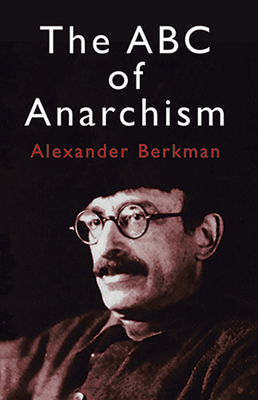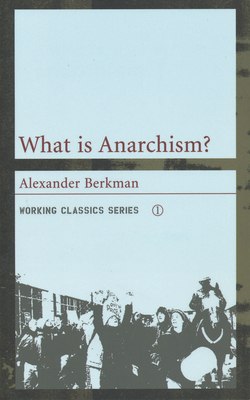



In a clear conversation with the reader, Berkman discusses society as it now exists, the need for Anarchism and the methods for bringing it about. Often mentioned in conjunction with his lover Emma Goldman, Berkman was a leading writer and participant in the 20th-Century Anarchist movement.
The young, idealistic Berkman practiced propaganda by the deed, attempting to assassinate Henry Clay Frick during the Homestead Steel Strike of 1892. While imprisoned, he wrote the classic tale of prison life, Prison Memoirs of an Anarchist. After his release, Berkman edited The Blast! and Goldman's Mother Earth. Deported to Russia in 1919, he saw firsthand the failure of the Bolshevik revolution and dedicated himself to writing this classic primer on Anarchism.

It was July 23, 1892, and Alexander Berkman was planning to die. He just had some business to attend to first. Dressed in a new suit and a black derby hat, Berkman burst into the Pittsburg office of Henry Clay Frick, the notoriously anti-union manager of the Carnegie Steel Company. From his pocket, Berkman produced a pistol.
This pocket-sized book collects the shorter works of one of the world's most influential anarchists.



This work has been selected by scholars as being culturally important, and is part of the knowledge base of civilization as we know it.
This work is in the public domain in the United States of America, and possibly other nations. Within the United States, you may freely copy and distribute this work, as no entity (individual or corporate) has a copyright on the body of the work.
Scholars believe, and we concur, that this work is important enough to be preserved, reproduced, and made generally available to the public. We appreciate your support of the preservation process, and thank you for being an important part of keeping this knowledge alive and relevant.

This work has been selected by scholars as being culturally important, and is part of the knowledge base of civilization as we know it.
This work is in the public domain in the United States of America, and possibly other nations. Within the United States, you may freely copy and distribute this work, as no entity (individual or corporate) has a copyright on the body of the work.
Scholars believe, and we concur, that this work is important enough to be preserved, reproduced, and made generally available to the public. We appreciate your support of the preservation process, and thank you for being an important part of keeping this knowledge alive and relevant.

This collection of essays and articles explores themes of anarchism, feminism, and the struggle for social justice, through the lens of Berkman and Goldman's radical politics. Their passionate and incisive writing makes this book an inspirational read for anyone interested in the history of radical political thought in America.
This work has been selected by scholars as being culturally important, and is part of the knowledge base of civilization as we know it.
This work is in the public domain in the United States of America, and possibly other nations. Within the United States, you may freely copy and distribute this work, as no entity (individual or corporate) has a copyright on the body of the work.
Scholars believe, and we concur, that this work is important enough to be preserved, reproduced, and made generally available to the public. We appreciate your support of the preservation process, and thank you for being an important part of keeping this knowledge alive and relevant.

This collection of speeches by Alexander Berkman and Emma Goldman provides a firsthand account of their trial before the United States District Court in New York in July 1917. The two anarchist activists were prosecuted for opposing US involvement in World War I and advocating for the overthrow of the government. The speeches provide insight into the radical politics of the era and the repression of dissent by the state. This book is a valuable resource for anyone interested in the history of anarchism and political repression in the United States.
This work has been selected by scholars as being culturally important, and is part of the knowledge base of civilization as we know it.
This work is in the public domain in the United States of America, and possibly other nations. Within the United States, you may freely copy and distribute this work, as no entity (individual or corporate) has a copyright on the body of the work.
Scholars believe, and we concur, that this work is important enough to be preserved, reproduced, and made generally available to the public. We appreciate your support of the preservation process, and thank you for being an important part of keeping this knowledge alive and relevant.





The pages of The Blast seem to smell of black powder, or better, seem to have blown out of the eye of a social hurricane. A sense of absolute emergency pervades almost every column. --Richard Drinnon
After serving as editor for Emma Goldman's Mother Earth, Alexander Berkman moved to San Francisco and started his own newspaper. This historical reprint of the complete 29 issues features articles, letters, news and editorials by Berkman and his revolution-minded contemporaries. Topics include the political trial of labor activists Mooney-Billings, a profile of Pancho Villa, the imprisonment of the Magon brothers, arrests of Goldman and Margaret Sanger for birth control agitation, and anti--conscription actions. Complete with powerful political artwork and photos.




A book of rare power and beauty, majestic in its structure, filled with the truth of imagination and the truth of actuality, emphatic in its declarations and noble in its reach.--Bayard Boyesen, Mother Earth.
No other book discusses so frankly the criminal ways of the closed prison society.-- Kenneth Rexroth
In 1892, Alexander Berkman tried to assassinate Henry Clay Frick for the latter's role in violently suppressing the Homestead Steel Strike. Berkman's attempt was unsuccessful. Berkman spent the next fourteen years in Pennsylvania's Western Penitentiary. Upon release, he wrote what was to become a classic of prison literature, and a profound testament to human courage in the face of oppression.
This new edition of his account of those years is introduced and fully annotated by Barry Pateman and Jessica Moran, both former associate editors of the Emma Goldman Papers at the University of California Berkeley. Their efforts make this the definitive version of Berkman's tale of his transformation within prison, his growing sympathy for those he'd considered social parasites, and the intimate relationships he developed with them. Also includes never-before-published facsimile reprints and transcriptions of the diary Berkman kept while he wrote this book, conveying the difficulties he had reliving his experiences.
Alexander Berkman (1870-1936) was a leading writer and militant in the anarchist movement and author of the classic primer What is Anarchism?
Barry Pateman was associate editor of Emma Goldman: A Documentary History, and editor of Chomsky on Anarchism. He is a historian and member of the Kate Sharpley Library collective.
Jessica Moran, was an assistant editor of Emma Goldman: A Documentary History. She is a member of the Kate Sharpley Library collective and is an archivist currently living and working in New Zealand.

